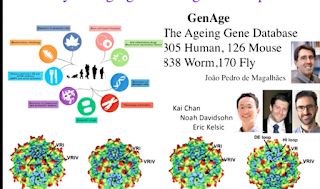Designer Babies and Designer Years
Designer Babies & Designer Years
by Lee J. Keller
As we head into 2019, we were struck with some fascinating conjectures from science that were certainly foreshadowed in Huxley's Brave New World, and that was the shocking announcement by a Chinese scientist that CRISPR and a gene-editing variant had been utilized to edit the genome of babies who have already been born. (Done as embryos and implanted via IVF). This (perhaps rightly) ignited tremendous discussion about designer babies. Never before had this been reported to have occurred beyond embryos, and in this case, among babies who are now living with an edited genome. (And also in this case, who had been edited to prevent HIV infection). This brought condemnation from all over the scientific and civilized world, and from the co-discoverers of CRISPR itself (both Doudna and Zhang) because the research world had already agreed that gene editing shouldn't be done in humans yet--to the extent that it could introduce changes in the germline. This was simply because we didn't and couldn't know what the long-term outcome of such edits might lead to. Anyway, what has resulted so far, is further admission from the scientist, that other babies also exist that have had edits done in that lab. Also, the Chinese government has apparently placed this scientist in some sort of house arrest or is guarding him at all times, and charges may be brought.
Now, comes along a headline reported in thenextbigfuture.com where George Church and his research team have developed over 40 different gene therapies ( https://www.nextbigfuture.com/2019/01/delivery-of-45-age-reversing-gene-therapies-at-once-is-under-peer-review.html )that could address cellular and other genomic expressions that addresses human aging and senescence. While Aubrey DeGrey has long been working on such things as well--we are led to consider the possibility of a different sort of designer humans--for longer lifespans, what I would call designer years. Among the various targets in this group of gene therapies are telomeres and research that has addressed high-fat diets that lead to obesity in animal studies, that have now in this research effectively changed mammalian cellular responses to high-fat diets. Certainly in the case of these diets and their impact on aging-related health problems and obesity--if such changes can be undone or somewhat remediated--this research with the gene therapies could prove very useful to humans.
What is the difference between such gene therapies and gene edits? They are basically the same thing! So why should one approach be viewed as safer than another? This will need to be decided...for as this definition of gene therapy shows: Gene therapy is a broad strategy for curing or treating disease by modifying, supplying or blocking genes or gene products that cause a condition either by their presence or absence. ... Gene therapy is any attempt to edit genes to cure some disease. CRISPR/Cas9 is a method of genome editing. from https://www.researchgate.net/post/What_is_the_difference_between_gene_therapy_and_CRISPR .
Since gene edits are what is basically being done in some gene therapies--however, in some gene therapies, other tools than CRISPR CAS9 might be used. The difference here is that Church's team has at least submitted the research to the scientific peer review community at large, and the Chinese researcher did not appear to do this before going ahead and doing the editing in humans that are now among the living. Kudos to the George Church team for submitting to peer review; so that the hope of all of this research's true benefits might be found. Also, it should be pointed out that engineered particles, proteins, and molecules are also being done that influence gene expression as well--an example might be in some immunotherapy techniques already used with human subjects with good results.~~LJK
If Aubrey de Grey is right, you could live forever https://buff.ly/2sp791B

Comments